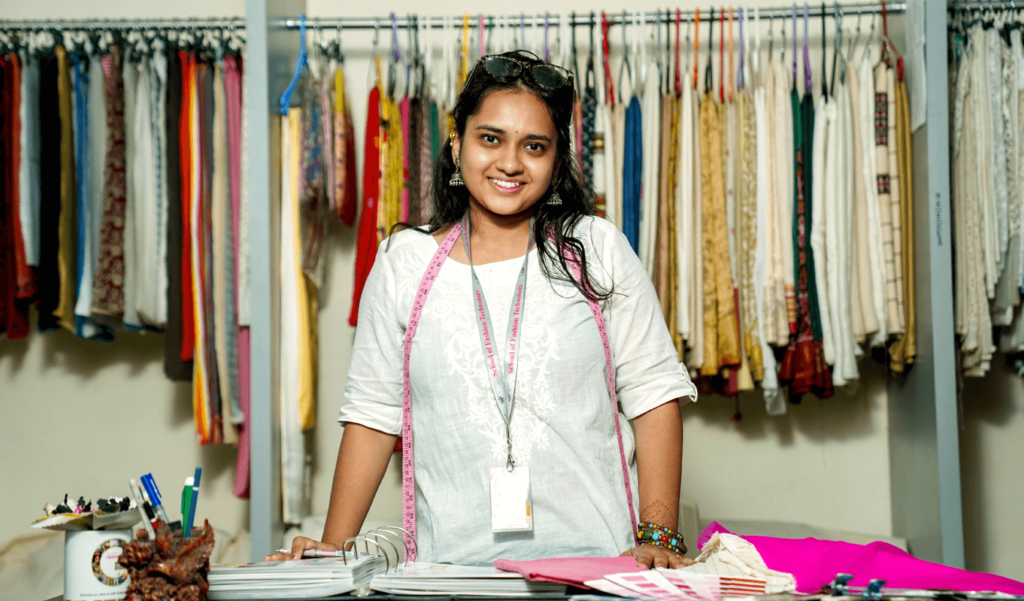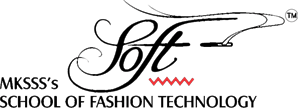Bachelor of Design in Textile Design

About Course
The Bachelor of Design in Textile Design at MKSSS’s School of Fashion Technology (SOFT), Pune, is an immersive program that delves into various aspects of textile design, including fabric development, surface ornamentation, textile pattern creation, and sustainable practices. By integrating traditional techniques with cutting-edge technology, SOFT ensures that graduates are not just industry-ready, but poised to become pioneers.
If you’re passionate about textiles and eager to combine creativity with innovation, this program could be your gateway to a dynamic career. Join us to transform your artistic visions into tangible creations that redefine the boundaries of textile design.
Why Choose Textile Design?
Textile Design is a vibrant field that merges creativity with practical application. This discipline involves crafting designs for woven as well as knitted fabrics, and enhancing textiles through printing, dyeing and surface ornamentation. For those passionate about fabric, patterns, and colors, Textile Design offers a unique opportunity to shape fashion trends and influence interior aesthetics globally.
- Dynamic and Versatile Career: Textile Design is at the intersection of art and functionality, making it a versatile career choice. You’ll learn to transform raw materials into intricate designs that tell a story and captivate consumers.
- Innovation and Tradition: This field embraces both traditional techniques and modern innovations, allowing you to create unique designs that stand out. Whether its handloom weaving or digital printing, the blend of old and new techniques keeps the craft exciting and relevant.
- Global Influence: With a career in Textile Design, you have the power to influence global fashion trends and interior design aesthetics. Your designs can adorn catwalks, homes, and commercial spaces, making a lasting impact on the world.
- Sustainability Focus: As the design industries move towards more sustainable practices, Textile Design offers a platform to innovate in eco-friendly materials and processes. You can be at the forefront of creating sustainable textiles that are both beautiful and environmentally conscious.
- Personal Fulfillment: For those who love textures, fabric, patterns, and colors, Textile Design offers a deeply fulfilling career. It allows you to express your creativity while working on tangible projects that bring your visions to life.
Curriculum Highlights
- Drawing & Sketching: Develop fundamental skills to translate ideas into visual representations.
- History of Art & Design: Explore the evolution of art and design to inform contemporary practices.
- Fundamentals of Design: Understand basic design principles applicable across various mediums.
- Technical Drawing: Gain proficiency in creating precise technical illustrations essential for textile production.
- Material Studies: Learn about different materials used in textiles, their properties, and applications.
- Computer-Aided Textile Design: Master digital tools for designing and rendering textile patterns.
- Dyeing and Printing Techniques: Acquire hands-on experience in various dyeing and printing methods to create unique textiles.
- Weaving Techniques: Understand the intricacies of weaving, including dobby and jacquard weaving.
- Surface Exploration Techniques: Experiment with different methods of dyeing, embroideries and more, to enhance the texture and appearance of textiles.
- Management and Marketing: Gain insights into the business side of the industry, including merchandising and market analysis.
Our curriculum is designed not just to foster creativity but also to impart practical skills that are crucial for success in the textile design sphere. Through a combination of traditional techniques and modern innovations, we prepare students to become industry ready.
Your Path to Success
If you are passionate about blending creativity with technical expertise and ready to make an impact in the textile industry, our Textile Design program is your launchpad.
Course Syllabus
Semester I
| Drawing & Sketching | (D) |
| History of Art & Design | (B) |
| Fundamental of Design | (B) |
| Environmental Studies | (D) |
| Communication Skills | (B) |
Semester II
| Technical Drawing – Foundation | (D) |
| Advance Design | (B) |
| Material Studies | (C) |
| Computers Application In Data Management And Presentation | (C) |
| Art Appreciation | (B) |
Semester III
| Introduction to Fibers, yarns and fabric | (A) |
| Traditional Indian Textiles | (A) |
| Design Process | (B) |
| Textile Design -Foundation | (A) |
| Fashion Studies and Women’s Studies | (C) |
Semester IV
| Introduction to Weaving and Testing | (A) |
| Surface Exploration Techniques | (B) |
| Fabric Development | (A) |
| Computer Aided Rendering Technique In Textiles | (A) |
| Fashion Management and Marketing & Merchandising | (C) |
Semester V
| Dyeing and Printing- Basic | (A) |
| Fabric Illustration | (A) |
| Quality Management | (A) |
| Fabric Development and Computerized Embroidery | (B) |
| Forecasting | (C) |
Semester VI
| Knits For Apparel & Home Furnishing | (B) |
| Craft Documentation | (A) |
| Dobby Weaving | (A) |
| Dyeing and Printing- Advance | (A) |
| Innovation in Textile Studies | (C) |
Semester VII
| Jacquard Weaving | (A) |
| Computer Aided Textile Design | (A) |
| Design Project | (A) |
| Internship | (B) |
| Introduction to Entrepreneurship & IPR | (C) |
Semester VIII
| Floor Coverings | (D) |
| Knit Design | (D) |
| Woven Design | (D) |
| Print Design | (D) |
| Design Collection | (A) |
| Visual and Retail Management | (C) |
| Portfolio Development | (B) |
(A) Core Subjects (B) Applied Subjects (C) Foundation Subjects (D) Electives
Admission Procedure
Eligibility criteria for the 1st year – B. Design
- XII th Pass in any Stream – Arts/Commerce/Science/Home Science/ Minimum Competency Vocational Course (MCVC) including National Institute of Open Schooling (NIOS).
- Maharashtra State Board of Technical Education (MSBTE)/ State Govt. Technical Education full time diploma of minimum 3 years after Std. X ( any stream)
- For NRI & Foreign students with equivalence from Association of Indian Universities (AIU), New Delhi
Criteria for selection of students for the 1st year
50% weightage for SOFT’s CET Marks , 50% weightage for XII Std./ Equivalent marks. (Minimum Eligibility 50%)
Eligibility criteria for 2nd year
- Three year Diploma, Dress making and Garment Manufacturing or Equivalent recognized by All India Council for Technical Education (AICTE) with Bridge course of 8 credits with additional Fees.
- Five year Diploma in Fine Arts recognized by the State Technical Board with Bridge course of 8 credits
- Successful completion of 1st year Degree from National Institute of Fashion Technology (NIFT)
- Successful completion of 1st year Degree of any B Design Fashion Or Equivalent Course offered by Indian Universities / Foreign university with equivalence from AIU.
The following are the subjects under bridge course
- Fashion Studies – 4 Credits Th2 Pr2
- Material Studies – 2 Credits Pr.
- Technical Drawing – 2 Credits Pr.
The prescribed bridge course needs to be completed by the candidate within the period of 60 days from the date of admission.
Admission to such candidate will be given up to 30 days from the commencement of the Semester.
Eligibility for admission to third and fourth year of B. Design will be according to the passing criteria and rules for ATKT as prescribed by Controller of Examinations
Exam Pattern
B Design Examination Schedule for University Exam for V, VI, VII & VIII.
The evaluation pattern is as follows as per passed in the Academic Council Meeting held on 20th September 2013.
| Proposed evaluation pattern for new modular structure syllabus | ||||||
| Credit | Credit | Internal | Internal | External | External | Total |
| TH | PR | TH | PR | TH | PR | |
| 4 | 0 | 25 | – | 75 | – | 100 |
| 3 | 1 | 15 | 10 | 60 | 15 | 100 |
| 2 | 2 | 25 | 25 | 50 | 25 | 100 |
| 0 | 4 | 0 | 100- Continuous assessment | – | – | 100 |
| 0 | 4-university Exam | – | 25 | – | 75 | 100 |
- All Practical subject exams except University level examination will have continuous assessment.
- University level Practical Examination will be as per the table given above.
Evaluation Pattern For SNDT Women’s University
- The evaluation pattern for SNDT Women’s university is based on the credits allotted to the subject.
- For first 4 semesters the evaluation is conducted on college level and next four semesters it is conducted on university level. The evaluation includes Internal and external marking.
- For College level subjects, the evaluation Pattern is Practical – Continuous Evaluation and theory – 25 marks internal (Class assignments, Class test) and 75 marks external exam. For university level subjects, the evaluation Pattern is theory and Practical – 25 marks internal (Class assignments, Class test) and 75 marks external exam.
- Separate passing is required for internal and external exams.
- An ATKT (Allowed to keep terms)criterion is 40% on total Heads.
Placement Department
Results
Duration:
2years (Post Graduate)
Fees:
Rs.2,00,000/year
Title will come here. Title will come here. Title will come here. Title will come here
Student's Review

As a Bachelor of Design, Fashion Design student at SOFT, my experience has been nothing short of transformative. The curriculum strikes the perfect balance between creativity and technical skill, encouraging us to push boundaries while honing our craft. The faculty, comprised of industry professionals, offer invaluable insights and mentorship, helping me refine my personal style and understand the complexities of the fashion world.

As a proud graduate of School of Fashion Technology, I can confidently say that this institution has been instrumental in shaping my future as a fashion professional. The blend of creativity and technical training I received here was truly world-class. From hands-on projects to industry exposure, every experience was designed to push my limits and help me discover my unique voice in fashion. The faculty’s expertise and mentorship played a huge role in refining my skills and igniting my passion. I am leaving with not only a strong portfolio but also the confidence to thrive in the fashion industry. I’m forever grateful for my time here!

I am a 2024 batch pass-out. I started my life in SOFT during COVID, but even when the world was shut, SOFT continued to persist for better education for its students. The faculty is top notch and possess industry experience. The practical as well as theory subjects were taught in a way which helped us create interest.
During the internship and placement process, we were given various opportunities. I interned with Landmark Group where I could use everything I had learned during my time in SOFT and got extremely good exposure to the industry and its intricacies.
I was placed with Myntra as a kids wear designer even before I gave my final exam. I am extremely thankful to our TPO, Ms. Smita Pattanaik ma’am for her constant guidance and support.
I also thank our Principal Dr. Ms. Garima Bhalla, our CC Dr. Yogesh Bokil and all the faculties who helped me reach where I am today.

People often pursue professional courses to gain an edge in their careers, but my experience at SOFT went far beyond the curriculum. I gained invaluable lessons in leadership, sisterhood, and accountability. It was at SOFT that I discovered my true passion for fashion styling and designing. This foundation was instrumental in shaping my career. Today, as a professional Design Thinker, I am deeply grateful for the strong base SOFT provided. I’ve had the privilege of learning from dedicated teachers who invested their heart and soul into their students. Now, as a successful fashion stylist and designer working with renowned clothing and jewelry brands, I attribute my determination, self-confidence, and commitment to the exceptional experience I had at the School of Fashion Technology

It was my dream to complete my designing from School of Fashion Technology, [SOFT] and it is completed with really great experience. I took almost 3 years of gap between my education just for SOFT and it was a really good decision of mine. The college is perfectly perfect with all the facilities, good infrastructure and mind-blowing faculties.
I can say all these things because now whenever I say I am a SOFT Student how people see us. Now I am working as a teacher in Nagpur Cadence Academy just because of the support and good education of SOFT.
